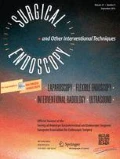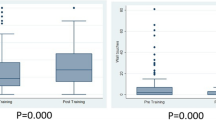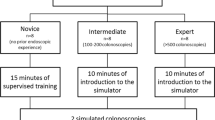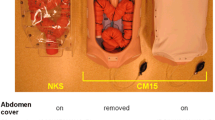Abstract
Background
Recently, it has been suggested that nurses can perform diagnostic endoscopy procedures, which traditionally have been a physician’s responsibility. The existing studies concerning quality of sigmoidoscopy performed by nurses are small, used assessment tools with insufficient validation and to date there is very little knowledge of the learning curve patterns for physicians and nurses. The aim of a present study was to assess early learning curves on a virtual-reality colonoscopy simulator of untrained residents as compared with that of nurses with and without endoscopy assistance experience.
Materials and methods
Thirty subjects were included in the study: 10 female residents (median age 30.5 years) without colonoscopy experience, 10 female nurses (median age 27.5 years) without endoscopy assistance experience and 10 female nurses (median age 42 years) with endoscopy assistance experience. All participants performed 10 repetitions of task 6 from the “Introduction” colonoscopy module of the Accu Touch Endoscopy simulator. Eight experienced colonoscopists performed three repetitions of task 6 in order to provide the reference expert level of performance.
Results
All subjects completed the virtual colonoscopy without complications. Significant differences existed between residents and nurses with respect to time to complete the procedure. Residents and nurses showed similar learning curve patterns. There were not significant differences between the groups in terms of volume of insufflated air, percentage of time without discomfort, and percentage of mucosa seen. None of the trainee groups achieved expert proficiency level in terms of time and amount of insufflated air by the tenth repetition.
Conclusions
Nurses performed virtual colonoscopy as accurately and safely as residents. Although the residents performed significantly faster, time differences showed a tendency towards decreasing, and appraisement of the numeric time differences seemed of minor practical importance. From a technical point of view this indicates that nurses may learn to perform colonoscopy after appropriate training.

Similar content being viewed by others
References
Bretthauer M, Ekbom A, Malila N, Stefansson T, Fischer A, Hoff G et al (2006) Politics and science in colorectal cancer screening. Ugeskr Laeger 168:2563–2565
Cheng TI, Wong JM, Hong CF, Cheng SH, Cheng TJ, Shieh MJ et al (2002) Colorectal cancer screening in asymptomatic adults: comparison of colonoscopy, sigmoidoscopy and fecal occult blood tests. J Formos Med Assoc 101:685–690
Verschuur EM, Kuipers EJ, Siersema PD (2007) Nurses working in GI and endoscopic practice: a review. Gastrointest Endosc 65:469–479
DiSario JA, Sanowski RA (1993) Sigmoidoscopy training for nurses and resident physicians. Gastrointest Endosc 39:29–32
Maule WF (1994) Screening for colorectal cancer by nurse endoscopists. N Engl J Med 330:183–187
Schoenfeld P, Lipscomb S, Crook J, Dominguez J, Butler J, Holmes L et al (1999) Accuracy of polyp detection by gastroenterologists and nurse endoscopists during flexible sigmoidoscopy: a randomized trial. Gastroenterology 117:312–318
Schoenfeld PS, Cash B, Kita J, Piorkowski M, Cruess D, Ransohoff D (1999) Effectiveness and patient satisfaction with screening flexible sigmoidoscopy performed by registered nurses. Gastrointest Endosc 49:158–162
Eversbusch A, Grantcharov TP (2004) Learning curves and impact of psychomotor training on performance in simulated colonoscopy: a randomized trial using a virtual reality endoscopy trainer. Surg Endosc 18:1514–1518
Grantcharov TP, Carstensen L, Schulze S (2005) Objective assessment of gastrointestinal endoscopy skills using a virtual reality simulator. JSLS 9:130–133
Felsher JJ, Olesevich M, Farres H, Rosen M, Fanning A, Dunkin BJ, Marks JM (2005) Validation of a flexible endoscopy simulator. Am J Surg 189:497–500
Ferlitsch A, Glauninger P, Gupper A, Schillinger M, Haefner M, Gangl A, Schoefl R (2002) Evaluation of a virtual endoscopy simulator for training in gastrointestinal endoscopy. Endoscopy 34:698–702
MacDonald J, Ketchum J, Williams RG, Rogers LQ (2003) A lay person versus a trained endoscopist: can the preop endoscopy simulator detect a difference? Surg Endosc 17:896–898
Mahmood T, Darzi A (2003) A study to validate the colonoscopy simulator. Surg Endosc 17:1583–1589
Cohen J, Cohen SA, Vora KC, Xue X, Burdick JS, Bank S et al (2006) Multicenter, randomized, controlled trial of virtual-reality simulator training in acquisition of competency in colonoscopy. Gastrointest Endosc 64:361–368
Ahlberg G, Hultcrantz R, Jaramillo E, Lindblom A, Arvidsson D (2005) Virtual reality colonoscopy simulation: a compulsory practice for the future colonoscopist? Endoscopy 37:1198–1204
Sedlack RE, Kolars JC, Alexander JA (2004) Computer simulation training enhances patient comfort during endoscopy. Clin Gastroenterol Hepatol 2:348–352
Sedlack RE, Kolars JC (2004) Computer simulator training enhances the competency of gastroenterology fellows at colonoscopy: results of a pilot study. Am J Gastroenterol 99:33–37
Sedlack RE, Kolars JC (2002) Colonoscopy curriculum development and performance-based assessment criteria on a computer-based endoscopy simulator. Acad Med 77:750–751
Marshall JB (1995) Technical proficiency of trainees performing colonoscopy: a learning curve. Gastrointest Endosc 42:287–291
Dall M (2007) Gastroenterologic endoscopy is (still) primarily a task for physicians!. Ugeskr Laeger 169:1591
Park J, MacRae H, Musselman LJ, Rossos P, Hamstra SJ, Wolman S et al (2007) Randomized controlled trial of virtual reality simulator training: transfer to live patients. Am J Surg 194:205–211
Mahmood T, Darzi A (2004) The learning curve for a colonoscopy simulator in the absence of any feedback: no feedback, no learning. Surg Endosc 18:1224–1230
Porte MC, Xeroulis G, Reznick RK, Dubrowski A (2007) Verbal feedback from an expert is more effective than self-accessed feedback about motion efficiency in learning new surgical skills. Am J Surg 193:105–110
Rogers DA, Regehr G, Howdieshell TR, Yeh KA, Palm E (2000) The impact of external feedback on computer-assisted learning for surgical technical skill training. Am J Surg 179:341–343
Author information
Authors and Affiliations
Corresponding author
Rights and permissions
About this article
Cite this article
Kruglikova, I., Grantcharov, T.P., Drewes, A.M. et al. Assessment of early learning curves among nurses and physicians using a high-fidelity virtual-reality colonoscopy simulator. Surg Endosc 24, 366–370 (2010). https://doi.org/10.1007/s00464-009-0555-7
Received:
Revised:
Accepted:
Published:
Issue Date:
DOI: https://doi.org/10.1007/s00464-009-0555-7




